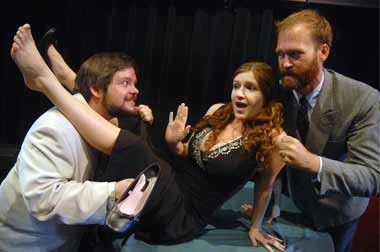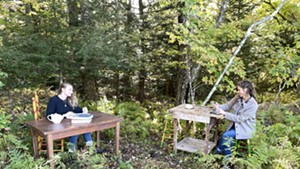
In the rogues' gallery of history's charlatans, religious hypocrites have made irresistible targets for wagging tongues and acid pens. Pharisees varied their vices over the centuries. During the Renaissance, not-so-celibate popes sired "nephews" to succeed them on the papal throne. Just last year, a prominent evangelical minister in Colorado preached against homosexuality while getting meth and "massages" from a gay male prostitute.
Seventeenth-century French playwright Molière gleefully skewered the Seven Deadly Sinning that abounded in the aristocratic and upper bourgeois circles orbiting the sumptuous court of his patron, Louis XIV. Church leaders took part in the decadence, and a debate raged over how their corruption and cupidity conflicted with Catholicism's professed values. Molière's acerbic and insightful comedy Tartuffe takes aim at holy men who loudly proclaim piety and asceticism while secretly indulging baser instincts. His timeless understanding of human folly, brilliantly rendered in snappy dialogue, makes the play as fresh and funny today as it was in 1669.
Lost Nation's terrific current production of Tartuffe reveled in the rhythms of Molière's language as well as its knee-slapping comic joys. Director Ethan T. Bowen used Pulitzer Prize-winning poet Richard Wilbur's definitive and delightful verse translation, which makes Molière's couplets feel like natural - albeit eloquent and witty - conversation. Bowen smartly accentuated the regularity of the poetry's meter by using symmetry as the key to his directorial design. The set was laid out on-center, and the actors were often arrayed symmetrically on stage. This framed the action in a visually pleasing way while containing some of the ebullient cast's tendencies toward farcical excess.
As the play opens, almost everyone is on to the titular faux holy man's game, except the man who matters most: midlife-crisis-addled Orgon, who's master of the house if not of his own wits. Orgon has taken Tartuffe into his home, rescuing the supposed noble fallen on hard times and coming under his spell of extreme religious self-denial. Orgon begins denying things to himself and his family while lavishing gifts on Tartuffe. Meanwhile, the monk works on getting the prize he most desires: having his way with Orgon's sexy young wife, Elmire.
The protestations of Orgon's family only strengthen his resolve to show them he's the boss. He won't listen to his sage brother-in-law Cléante, who points out, "Those whose hearts are truly pure and lowly / Don't make a flashy show of being holy." Orgon decides to cement his relationship with Tartuffe by forcing his daughter Marianne to marry him, despite her pre-existing engagement to Valère. The teen lovers are heartbroken. Marianne's mercurial brother Damis and her outspoken maid Dorine argue vociferously, and fruitlessly, against the match.
Orgon doesn't even believe Elmire when she tells him Tartuffe tried to seduce her. Can she finally undo the phony by orchestrating a second seduction attempt, so that Orgon overhears Tartuffe's sophistry? The holy man's twisted logic of lust is priceless: "Some joys, it's true, are wrong in Heaven's eyes / Yet Heaven is not averse to compromise . . . And any wrongful act you care to mention / May be redeemed by purity of intention." One wonders how many times less lyrical versions of these lines have rolled off the tongues of real-life bogus Bible-thumpers.
For Lost Nation's production, director Bowen seemed to be trying to highlight the play's perennial relevance by evoking different time periods in the visual elements. Jenny Fulton's pretty set dripped with Art Deco details - stylized Neoclassical furniture and design flourishes, tied together by a swanky cream, gold and pale-green color scheme.
Kate Jansyn Thaw's costumes careened up and down the fashion timeline. Elmire's elegant black-and-silver gown fit the Deco décor, as did Orgon's considerably more casual pale-blue, double-breasted suit. The trendy trio of teens, however, looked like they walked out of Old Navy without checking a mirror. Cléante's tweed jacket said, "Off to the Yale Club for a G&T." Tartuffe's cream suit, while exquisitely tailored, seemed the stylistic product of a Conan O'Brien "If They Mated" segment - between Nehru and Don Johnson. And, after all the modern mishmash, the final character appeared in full 17th-century regalia: bewigged, masked, in buckled shoes and breeches! The overall effect of the clothing hodgepodge was disconcerting and, at times, distracting.
The acting, however, rose to a higher and much more consistent standard. Dialogue in verse is demanding. In Tartuffe, every line is part of a rhyming couplet, every syllable integral to the poetic meter. The slightest stumble sticks out. The actors had clearly embraced the linguistic challenge with zest, and were nearly letter-perfect by last Saturday's matinee.
The star was Abby Paige, as the impertinent Dorine. The button-pushing, manipulative maid sasses her boss while sticking up for her vulnerable young charge, Marianne. Paige drew on a hilarious range of facial expressions and physical gestures to underscore Dorine's flippant digs, which she tossed off with ease and relish. Her jaw jutted, eyes flashed, lips pursed and twisted - and she jabbed her feather duster like a lethal weapon.
Alicia Rodis, as Elmire, and G. Richard Ames, as her brother Cléante, also inhabited Molière's words with a great sense of naturalism. Both spoke the poetry conversationally, while retaining its metrical grace - not an easy feat. Ames was particularly successful in his long tirades to Orgon about Tartuffe, sounding convincingly like a passionate brother-in-law trying to protect his family, not a versifying actor. Rodis carried off an even trickier task: wrestling with the slick, smarmy Tartuffe verbally and physically. She conveyed the comedy without resorting to slapstick silliness.
The rest of the cast ventured a little further into farce. It was highly entertaining, but perhaps not entirely true to the play's main comic thrust - illustrating the well-deserved comeuppance of a cad. As Tartuffe, Dan Renkin channeled Nathan Lane - flexibly expressive, funny and physical, but mugging for the cheap seats just a tad much. Peter Husovsky captured Orgon's frustration, exasperation and frequent outbursts of red-faced choler. His interpretation amused, but the forceful striding and gesticulating felt somewhat two-dimensional.
Over-the-top characterizations worked well, however, for the secondary roles. The teen trio delighted with their tabloid-worthy immaturity and hotheaded antics. Jodie Pfau made Marianne into a Nicole Richie waif with kohl-rimmed saucer eyes, perpetually pleading and pouty. Pfau's charming aura of helplessness showed how Marianne inspires the adolescent machismo of those trying to save her. Steve Svec portrayed the reckless brinksmanship of her brother Damis with edgy gusto. Michael Peterson conjured the bipolar lunacy of her lover Valère with goofy enthusiasm.
Stylization worked well in the minor roles, too. Both Tim Tavcar and Hiroko Sawaki had a pair of small parts. Tavcar painted the Bailiff's unctuousness and the Police Officer's pomposity with aplomb. Sawaki conveyed the servant's balance of self-importance and humility in her mostly mute roles.
Only Lisa Jablow, in the larger part of Orgon's mother, Madame Pernelle, failed to inhabit her character effectively. Molière's language seemed not to roll off her tongue. It drove home the point so often illustrated by mediocre productions of Shakespeare: When it comes to dialogue written in verse, merely reciting the lines fails to convey the meaning. An actor can pronounce every word, and the audience can still have no idea what is being said.
But this exception just underscored the phenomenal achievement of the rest of the cast, which was giving wing to Molière's glorious language. His nearly 350-year-old comedies are amazingly modern and side-splittingly funny. As with all haute cuisine, the preparation and presentation take considerable skill. And at Lost Nation, chef Bowen and company served up a tasty Tartuffe.










Comments
Comments are closed.
From 2014-2020, Seven Days allowed readers to comment on all stories posted on our website. While we've appreciated the suggestions and insights, right now Seven Days is prioritizing our core mission — producing high-quality, responsible local journalism — over moderating online debates between readers.
To criticize, correct or praise our reporting, please send us a letter to the editor or send us a tip. We’ll check it out and report the results.
Online comments may return when we have better tech tools for managing them. Thanks for reading.